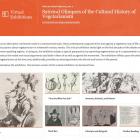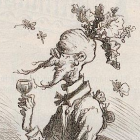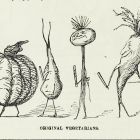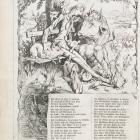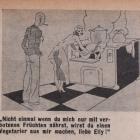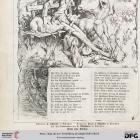Humans, Animals, and Nature: Ideas of a Natural and Harmonious (Co-)Existence
In today’s Western societies, meat prices only play a minor role in arguments by advocates of a meatless diet. It should not be forgotten, however, that in the nineteenth century, high meat prices and taxes forced many people to reduce or give up meat consumption involuntarily. An early satirical commentary, Die Fleischtheuerung (“The meat inflation”), imagines a gathering of oxen just before slaughter.
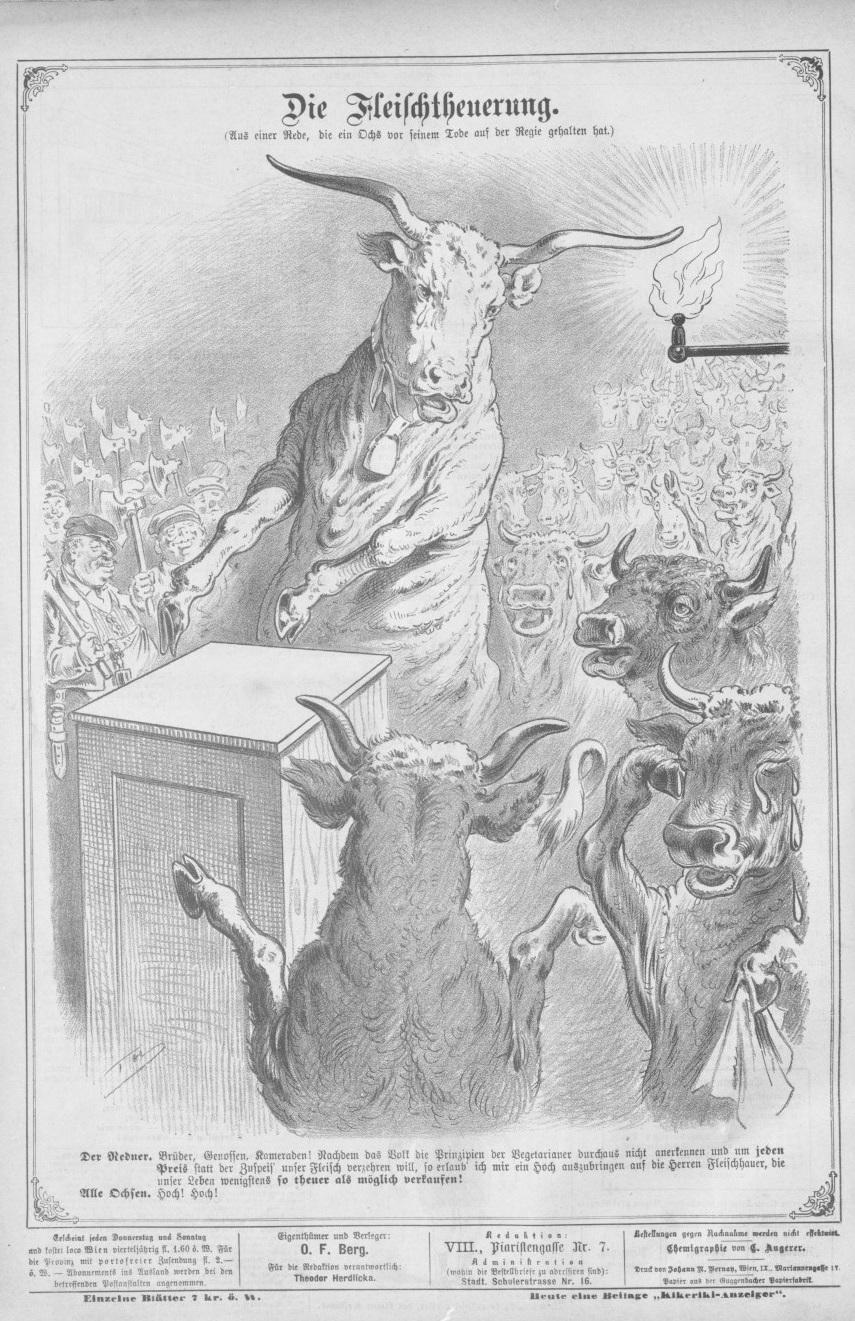
Die Fleischtheuerung (The meat inflation). Theodor Haltmayer (1846–?), 1879.
Die Fleischtheuerung (The meat inflation). Theodor Haltmayer (1846–?), 1879.
Courtesy of ANNO/Österreichische Nationalbibliothek. Originally published in Kikeriki 23 (November 1879): 4.
Click here to view source.
 This work is licensed under a Creative Commons Public Domain Mark 1.0 License.
This work is licensed under a Creative Commons Public Domain Mark 1.0 License.
Die Fleischtheuerung.
(Aus einer Rede, die ein Ochs vor seinem Tode auf der Regie gehalten hat).Der Redner. Brüder, Genossen, Kameraden! Nachdem das Volk die Prinzipien der Vegetarianer durchaus nicht anerkennen und um jeden Preis statt der Zuspeis’ unser Fleisch verzehren will, so erlaub’ ich mir ein Hoch auszubringen auf die Herren Fleischhauer, die unser Leben wenigstens so theuer als möglich verkaufen!
Alle Ochsen. Hoch! Hoch!
The meat inflation.
(From a speech that an oxen gave before his death).The speaker. Brothers, companions, comrades! Since the people absolutely do not want to recognize the principles of the vegetarians and want to consume our meat, instead of side dishes, at any price, I allow myself to praise the butchers who at least sell our lives for as much money as possible!
All oxen. Hear! Hear!
The applause of the weeping oxen can be interpreted as gallows humor, as the animals have no reason to rejoice. Full of sarcasm, the meat inflation is praised as a last resort to move people to reduce their meat consumption. However, given the continuing demand, the oxen would actually have reason to scold the people for their lack of compassion.
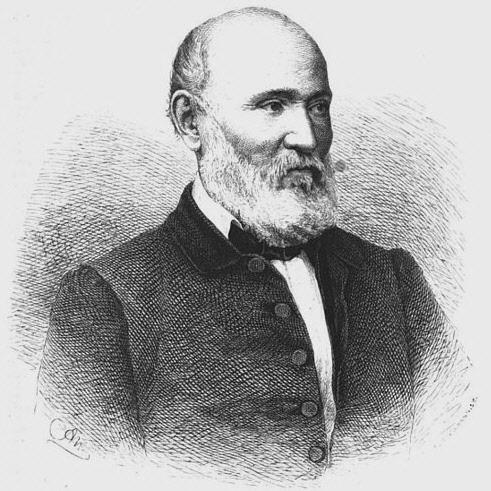
Gustav Struve (1805–1870), known as a leader in the revolutions of 1848–49 and founder of the Stuttgart vegetarian society, portrayed by an unknown artist in the magazine Die Gartenlaube in 1865.
Gustav Struve (1805–1870), known as a leader in the revolutions of 1848–49 and founder of the Stuttgart vegetarian society, portrayed by an unknown artist in the magazine Die Gartenlaube in 1865.
Unknown artist, 1865.
Accessed via Wikimedia on 13 August 2019. Click here to view source.
 This work is licensed under a Creative Commons Public Domain Mark 1.0 License.
This work is licensed under a Creative Commons Public Domain Mark 1.0 License.
Although animal ethics did not rank among the most important concerns named by the majority of early vegetarians, they were crucial for one of vegetarianism’s most influential representatives. Gustav Struve begins his book Pflanzenkost (“Vegetable food”) with an early childhood memory, according to which he had felt, even then, “a deep repugnance” when he saw “animals being dragged to the slaughterhouse” (1869, 1). At the age of 25, he stopped eating meat; nearly 40 years later he founded one of the first vegetarian societies and became one of the central figures of German vegetarianism in the nineteenth century. Although he produced a variety of arguments for a meat-free diet, he clearly stated that his primary concern was the welfare of animals: “The moral side of the doctrine is the main thing for me. The slaughter of animals, especially the so useful and harmless domestic animals, has always been an abomination to me” (Baltzer 1868, 6).
Another early verbo-visual satire of high artistic quality takes the new vegetarian movement as an opportunity to imagine a dystopian Zukunftsbild (“Vision of the future”). The picture shows hungry, formerly herbivorous animals now lunging at humans to devour them.

Zukunftsbild (Vision of the future). Ludwig Bechstein (1843–1914), 1880.
Zukunftsbild (Vision of the future). Ludwig Bechstein (1843–1914), 1880.
Courtesy of Universitätsbibliothek Heidelberg.
Originally published in Fliegende Blätter 73, no. 1823–1848 (1880): 174.
Click here to view source.
 This work is licensed under a Creative Commons Public Domain Mark 1.0 License.
This work is licensed under a Creative Commons Public Domain Mark 1.0 License.
Zukunftsbild.
Die pflanzenfressenden Thiere (zu den Vegetarianern): “Ihr habt uns unvernünftig gedeihen und uns schrecklich vermehren lassen, und habt dafür unsere Nahrung weggefressen, – nirgends mehr Gras und Kraut! So zwingt Ihr uns, Fleischfresser zu werden und Euch Alle selber zu fressen!”Vision of the future.
The herbivorous animals (to the vegetarians): “You have allowed us to thrive unreasonably and let us multiply terribly, and have eaten our food—there are no more grass and herbs! So you force us to become carnivores ourselves and eat you all!”
The argument expressed in the text at the bottom of the caricature, that people who eat only plants take away food from animals, may have been convincing in the period before industrial food production. In arguing that the vegetarians have destroyed the natural food chain and endangered the human species, the text reveals a belief in a natural order, a functioning ecosystem. Even if one might laugh at this reasoning, the message was quite prescient: in the Anthropocene we should reconsider our ecosystemic interventions and must reckon with potential future consequences, including our self-destruction as a species. Today’s cartoons might humorously comment on the reduction of our meat consumption, for example, by picking up the grasshopper seen in the foreground, ascribing new importance to it or mocking it as the food of the future.
In the nineteenth century, there was much debate about the question of which way of living could be regarded as “natural.” The vegetarians around Eduard Baltzer referred to themselves as “Freunde der natürlichen Lebensweise” (Friends of the natural way of life), and the later Vegetarische Rundschau (Vegetarian review) was subtitled “Monthly Journal of the Natural Lifestyle.” In his book Die natürliche Lebensweise, der Weg zu Gesundheit und sozialem Heil (The natural way of life, the road to health and social salvation) Baltzer writes: “It is a striking phenomenon that, the higher a ‘culture’ rises, the greater the suffering of mankind seems to become” (Baltzer 1867, 8).
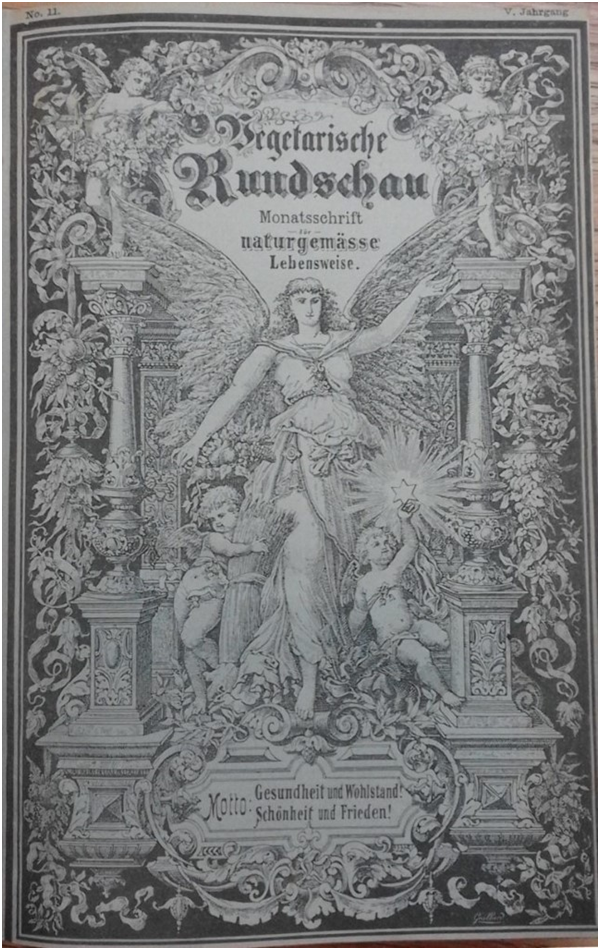
Cover of the magazine Vegetarische Rundschau. Monatsschrift für naturgemäße Lebensweise, 1897.
Cover of the magazine Vegetarische Rundschau. Monatsschrift für naturgemäße Lebensweise, 1897.
© Birgit Pack. Originally published in Vegetarische Rundschau. Monatsschrift für naturgemäße Lebensweise, no. 11 (1897).
Used by permission.
The copyright holder reserves, or holds for their own use, all the rights provided by copyright law, such as distribution, performance, and creation of derivative works.
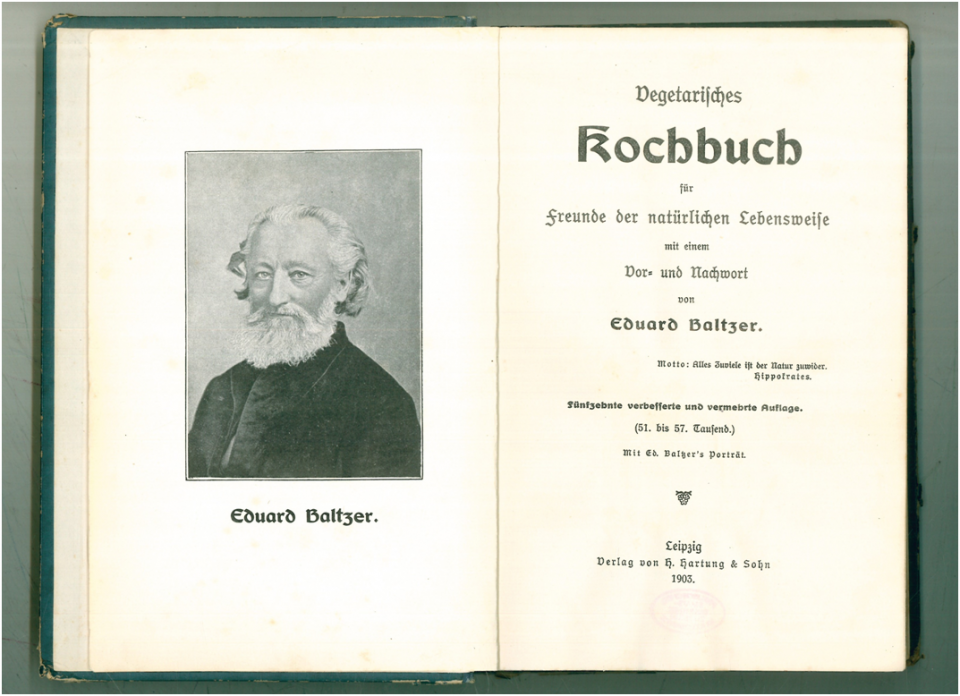
Eduard Baltzer (1814–1887) was the founder of the first German-speaking Vegetarian Society in 1867 in Nordhausen, Germany. His vegetarian cookbook was reprinted more than 20 times between 1868 and 1939 (see Pack 2019). Shown here are the first pages of the 1903 edition.
Eduard Baltzer (1814–1887) was the founder of the first German-speaking Vegetarian Society in 1867 in Nordhausen, Germany. His vegetarian cookbook was reprinted more than 20 times between 1868 and 1939 (see Pack 2019). Shown here are the first pages of the 1903 edition.
Scanned by Sophia Burgenmeister and Evi Zemanek.
 This work is licensed under a Creative Commons Public Domain Mark 1.0 License.
This work is licensed under a Creative Commons Public Domain Mark 1.0 License.

The cover of the 1913 edition of Baltzer’s vegetarian cookbook.
The cover of the 1913 edition of Baltzer’s vegetarian cookbook.
Scanned by Sophia Burgenmeister and Evi Zemanek.
 This work is licensed under a Creative Commons Public Domain Mark 1.0 License.
This work is licensed under a Creative Commons Public Domain Mark 1.0 License.
As the vegetarian movement gained visibility, a broad controversy unfolded—not only among scientists but also among educated laymen—as to whether humans are “naturally” carnivores or herbivores. In this context, both sides compared human teeth and intestines to the anatomy of other animals. From these investigations, vegetarians as well as the defenders of a meat-rich diet derived supposed evidence for their respective positions. The “indifference of children towards meat,” which Rousseau had already cited in his Émile as an argument, served to justify the thesis that unspoiled humans would not eat meat (1762, 513). In this view, meat consumption was seen as a symptom of humans’ alienation from nature and progressive brutalization. Others, however, considered eating meat as the most natural thing: “This murderous war of all against all—it is what keeps living nature eternally young and new and fresh. The fight is healthy and normal” (Bunge 1885, 43).
A few years after the publication of the above dystopian “Vision of the future,” a utopian counterpart appeared showing a man in the midst of animals that flock around him with confidence.
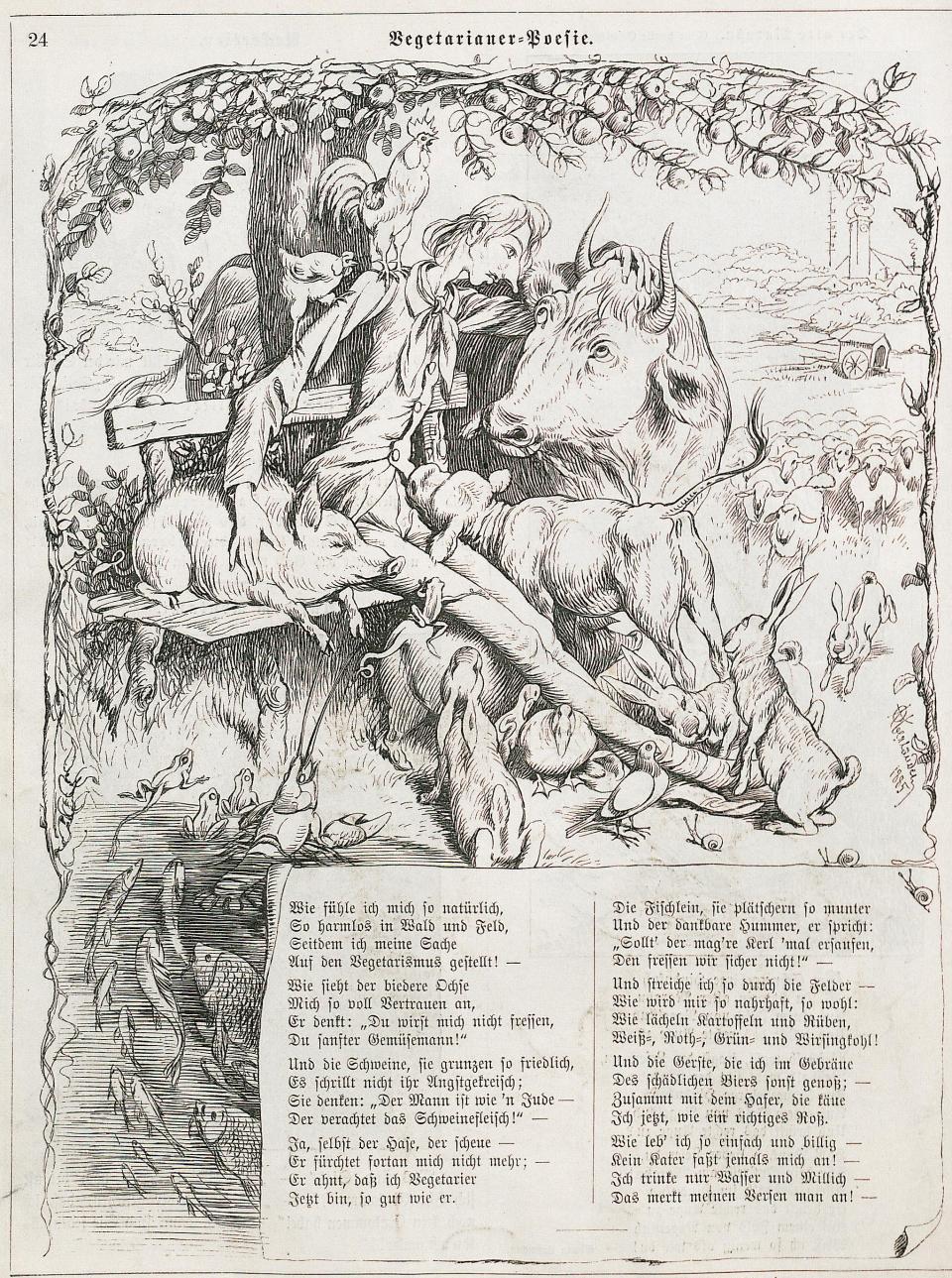
Vegetarianer-Poesie (A vegetarian’s poetry). Illustration by Adolf Oberländer (1845–1923) and poem by unknown author, 1886.
Vegetarianer-Poesie (A vegetarian’s poetry). Illustration by Adolf Oberländer (1845–1923) and poem by unknown author, 1886.
Courtesy of Universitätsbibliothek Heidelberg.
Originally published in Fliegende Blätter 84, no. 2110–2135 (1886): 24.
Click here to view source.
 This work is licensed under a Creative Commons Public Domain Mark 1.0 License.
This work is licensed under a Creative Commons Public Domain Mark 1.0 License.
Vegetarianer-Poesie.
Wie fühle ich mich so natürlich,
So harmlos in Wald und Feld,
Seitdem ich meine Sache
Auf den Vegetarismus gestellt! –Wie sieht der biedere Ochse
Mich so voll Vertrauen an,
Er denkt: “Du wirst mich nicht fressen,
Du sanfter Gemüsemann!”Und die Schweine, sie grunzen so friedlich,
Es schrillt nicht ihr Angstgekreisch;
Sie denken: “Der Mann ist wie’n Jude –
Der verachtet das Schweinefleisch!” –Ja, selbst der Hase, der scheue –
Er fürchtet fortan mich nicht mehr; –
Er ahnt, daß ich Vegetarier
Jetzt bin, so gut wie er.Die Fischlein, sie plätschern so munter
Und der dankbare Hummer, er spricht:
“Sollt’ der mag’re Kerl ’mal ersaufen
Den fressen wir sicher nicht!” –Und streiche ich so durch die Felder –
Wie wird mir so nahrhaft, so wohl:
Wie lächeln Kartoffeln und Rüben,
Weiß-, Roth-, Grün- und Wirsingkohl!Und die Gerste, die ich im Gebräue
Des schädlichen Biers sonst genoß; –
Zusammt mit dem Hafer, die käue
Ich jetzt, wie ein richtiges Roß.Wie leb’ ich so einfach und billig –
Kein Kater faßt jemals mich an! –
Ich trinke nur Wasser und Millich –
Das merkt meinen Versen man an! –—Unknown author, “Vegetarianer-Poesie,” in Fliegende Blätter 84, no. 2110–2135 (1886): 24.
A Vegetarian’s Poetry.
How natural I feel, how harmless
When through forest and field I flit,
Since to vegetarianism
I decided to commit!—How the good ox now regards me,
So full of trust his scan,
He thinks, “you will not eat me,
Gentle vegetable man!”And the hogs, they grunt contentedly
No fearful squeal from them;
They think, “this man is like a Jew—
He won’t eat any ham!”—Yes, even the shy rabbit—
No longer shrinks from me;—
He knows I’m vegetarian
Now, I’m as good as he.The little fish babble cheerfully
The grateful lobster chimes in:
“If this skinny fellow were to drown
We’d surely not eat him!”—And so, through the fields I stroll—
So wholesome, with such healthy habits:
How they smile, the potatoes and the turnips,
White, red, green, and savoy cabbage!And the barley in the golden brew
Of the toxic beer I loved;—
This barley I now chew with oats
Like a real stud.How I live so simply and frugally—
Ne’er a hangover must I nurse!—
I drink only water and milk—
As you can tell from my verse!—(Trans. Kimberly Coulter.)
The new relationship of trust between human and beast is, of course, based on the animals’ knowledge that the vegetarian is not going to eat them, and, at the same time, on the fact that the scrawny man is not a tempting prey himself. His lyrical self-description stresses his “natural,” “harmless,” and “gentle” temperament. He depicts a life in peaceful harmony with nature, which includes the renunciation of alcohol. The poem’s punch line hidden in the last verse, however, is that the abstinence from alcohol can be felt in his somewhat too harmless verses that can compete neither with fiery love poetry nor with the patriotic poems of the time, and therefore must be seen as a new genre, namely “Vegetarian poetry” (Vegetarianer-Poesie). Thus, the poem alludes to the topos of the softened, effete vegetarian. One of the earliest prejudices against vegetarians was that they have a weak mind and lead a passionless life. To the accusation found in various newspapers that “the vegetable diet produces quiet, apathetic, limp, gentle, obedient, peaceful shepherd peoples” the naturopath Theodor Hahn objects indignantly in his work Die Ritter vom Fleische (The knights of the flesh): “Oh, the nonsense of meat-fed brains!” (1869, 67).
The situation is complex and sometimes paradoxical. Men like Erich Mühsam, who came into contact with vegetarianism on Monte Verità—the “Hill of Truth” in Ascona, Switzerland, the site of utopian experiments around 1900—saw in this diet a threat to “masculinity” and defamed the lifestyle as female nonsense (Bollmann 2017, 118–20). At the same time, however, the great majority of members in the vegetarian societies were men. Accordingly, among numerous caricatures, only one, bearing the title Rache (“Revenge” ), foregrounds a female vegetarian.
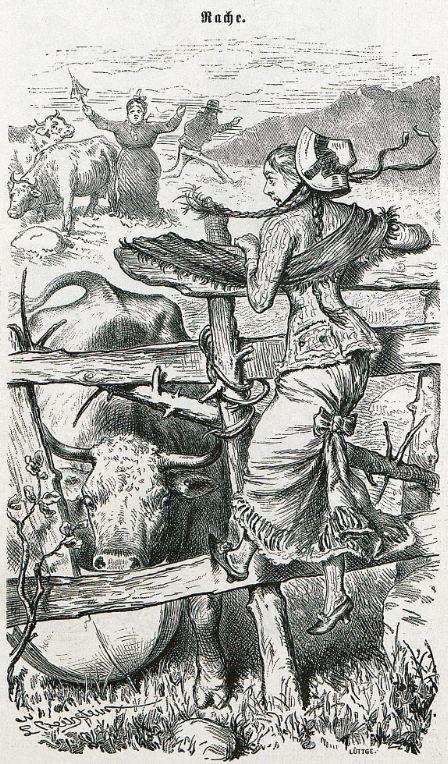
Rache (Revenge). Ludwig Bechstein (1843–1914), 1880.
Rache (Revenge). Ludwig Bechstein (1843–1914), 1880.
Courtesy of Universitätsbibliothek Heidelberg.
Originally published in Fliegende Blätter 72, no. 1797–1822 (1880), 12.
Click here to view source.
 This work is licensed under a Creative Commons Public Domain Mark 1.0 License.
This work is licensed under a Creative Commons Public Domain Mark 1.0 License.
The accompanying text reads:
Rache.
Eine aus Vegetarianern bestehende Gesellschaft war jüngst beim Spazierengehen zwischen eine Heerde Rindvieh gerathen. Ein Ochse erboste sich über den rothen Shawl, welchen eine der jüngeren Damen trug und verfolgte dieselbe mit solcher Wuth, daß sie sich nur mit genauer Noth über den Zaun retten konnte, der die Viehweide begrenzte. “So, du grobes, garstiges Thier!” rief die junge Dame, welche vor Angst und Aufregung am ganzen Körper bebte, der wüthenden Bestie über den Zaun hinüber zu: “Das ist also der Dank dafür, daß ich ein halbes Jahr lang nichts als wie Pflanzenkost genossen habe! Von heute an esse ich wieder alle Tage Rindfleisch.”Revenge.
A group of vegetarians, during a walk, had recently found themselves among a herd of cattle. An ox felt provoked by the red shawl worn by one of the younger ladies, whom he pursued with such fury that she barely managed to escape, with great distress, over the fence that bounded the pasture. “You rude, nasty animal!,” cried the young lady, who trembled with fear and agitation, over the fence towards the furious beast: “So this is how you thank me for having eaten nothing but vegetables for half a year! From now on, I’ll eat beef again every day.”
Here, the harmonious human-animal relationship as visualized in the preceding caricature has turned into its opposite again: the tame ox (that we had seen in the other image) has become a wild bull in the eyes of the woman. Although the reaction of the ignorant animal—ungrateful in the woman’s perception—is not directed against her personally, its behavior causes her to seek revenge. This hints at the vegetarian’s deprivation and suggests that her belief in the possibility of a peaceful coexistence was merely a delusion.




